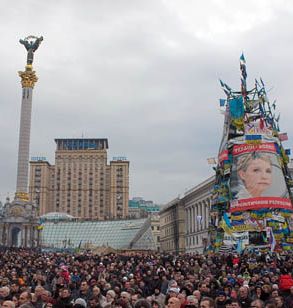Sunday’s referendum in Crimea produced the expected result. That vote – and steps by the Russian parliament, the Duma – lay the groundwork not only for Russia’s annexation by Crimea, but for a more formal takeover of lands beyond, say Atlantic Council Senior Fellow Adrian Karatnycky and other analysts. Like many, Karatnycky begins by noting the flaws that undermined any notion of a democratic, free choice in the vote. “It had all the characteristics of a totalitarian plebiscite, . . . with large numbers of vigilantes and local militias projecting intimidation, and with pro-Russia propaganda dominating the airwaves.”
Here is a sampling of analyst opinion:
|
Adrian Karatnycky: Russia opens door to annexing Georgian, Moldovan, other territories.
“The actions of Russia’s legislature set in place more than the possible incorporation of Crimea into Russia. They also open the door to the incorporation of Georgia-breakaway regions South Ossetia and Abkhazia, and Moldova’s Transdnistria – as well as the rapid incorporation of any new territories Russia may invade in Ukraine or elsewhere. In short, unless sanctions and counter-measures by the U.S. bite and bite hard, Crimea may be the beginning of a wider process of Russian territorial expansion.
“If Russia incorporates Crimea, Mr. Putin will not stop there. Look to Transdnistria’s and Gagauzia’s annexation. . . . Russia could soon have new territories close to the EU’s eastern border. It is worth noting that Gagauzia, a part of Moldova that borders EU member Romania, held its own Crimea-style referendum on February 2nd, opting for independence if Moldova becomes a member of the European Union. This was done directly under Mr. Putin’s instruction.
“In short, Mr. Putin is openly at war with the West, seeking to halt the expansion of democratic Europe and opening a Pandora’s box of new Russian annexations, military invasions and the projection of Russian forces westward to the EU’s borders. These are ominous developments”.
Paul Goble: Moscow’s legislation to annex Crimea and other new areas detours Russia further from the rule of law.
Russia’s legislature, the Duma, is considering a bill to permit the Russian Federation to annex territories that are part of other states, notes Eurasia scholar Paul Goble. That is one of three measures under consideration that, if ”approved in their current forms, . . . push Russia even further away from the modern, law-based state its leaders declare it to be, and some of its well-wishers often assume it already is,” Goble writes in a blog post.
“The first of these is a proposal by the Communist Party to restore the Soviet-era nationality line in passports and other official documents and to add a new one to fix religious affiliation as well. The second would impose criminal penalties on Russophobia.” . . .
Regarding the third, “according to Leonid Slutsky, the chairman of the Duma Committee on the CIS, if adopted, it would allow Russia to recover Crimea and other territories on the post-Soviet space.”
Dmitri Trenin: Russia has effectively taken over Crimea; the West should focus now on mainland Ukraine.
Accepting the doubts about the referendum’s legitimacy, Dmitri Trenin, the director of the Carnegie Moscow Center, moves quickly to observe that, “the actual process of Crimea’s integration into the Russian Federation will take some time, but from now on this is a technicality.”
Trenin adds: “The focus of attention should now be on Ukraine. Dismissing the mass anti-Maidan rallies in the east of the country as the work of “thugs” sent from Moscow is self-delusion. The obvious ultra-nationalism of at least part of the victorious coalition in power in Kiev naturally invites a push-back in the regions with a different historical narrative. Ukraine has reached the point where its federalization may be the only means to hold the country in one piece, avoid a civil war, and give it a new chance at nation-building. The fact that Ukraine’s federalization happens to be advocated by Moscow should not disqualify it. The alternatives may be worse.”
